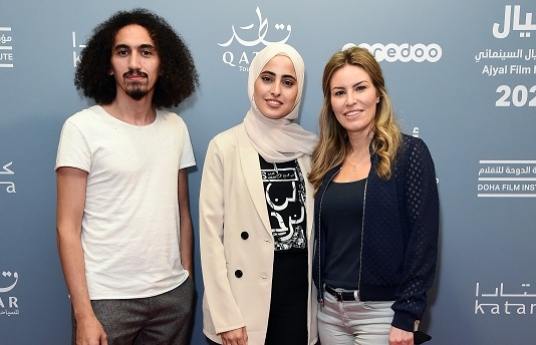مهرجان أجيال السينمائي التاسع يسلّط الضوء على المنظور الجديد لفلسطين
12 نوفمبر 2021 — المهرجان السينمائي

- صُنَّاع التغيير منى الكرد وفرح نابلسي وعبد الله الخطيب يناقشون قوة وسائل التواصل الاجتماعي والسينما في تصحيح المفاهيم الخاطئة
الدوحة، قطر، 12 نوفمبر 2021: شهد مهرجان أجيال السينمائي التاسع، الذي تنظمه مؤسسة الدوحة للأفلام مؤتمراً صحفياً لثلاثة من أبرز النشطاء وصنَّاع الأفلام الفلسطينيين في العالم لمناقشة الظلم والاضطهاد الذي يتعرَّض له الشعب الفلسطيني.
وضم المؤتمر كلاً من منى الكرد، إحدى أكثر الشخصيات تأثيراً في العالم لعام 2021 بحسب مجلة تايم والتي استلهم معرضُ أجيال الفني لهذا العام لن نرحل فكرتَه من نضال عائلتها التي تعيش في حى الشيخ جراح المحاصر، إلى جانب فرح نابلسي، مخرجة فيلم الهدية الذي وصل للقائمة القصيرة في جوائز أوسكار، وعبدالله الخطيب، مخرج فيلم فلسطين الصغرى الذي يُعرَض خلال مهرجان أجيال السينمائي.
قالت منى الكرد إن الفلسطينيين يطالبون بدعم دولي وتحرك دبلوماسي “ضد الاحتلال والتطهير العرقي الذي تمارسه إسرائيل” وسلطت الضوء على الدور الذي لعبته وسائل التواصل الاجتماعي في إيصال صوت الفلسطينيين للعالم.
وأضافت: “وسائل التواصل الاجتماعيّ أداة قوية عزَّزت أصواتنا. إننا نتبنى خيار المقاومة الإلكترونية لنخبر العالم بالحقيقة. نريد من العالم أن يضغط على إسرائيل لاتخاذ إجراء فوري”.
كما أوضحت أن معرض أجيال الفني والمهرجان بشكل عام “أتاح نافذة يخبر العالمَ من خلالها عن محنة الشعب الفلسطيني. الفن شكل نبيل من أشكال المقاومة”.
من جهتها، أعادت فرح نابلسي التأكيد على قوة الفن باعتباره أداة تواصل “قادرة على تناول الصور النمطية والمفاهيم الخاطئة” وصرحت أن عليها مسؤولية تتمثل في مخاطبة وجدان الناس من خلال الموضوعات التي تعكس هويتها. كما أشارت أنها تشعر أن وسائل التواصل الاجتماعي غيرَّت المشهد ولكنها حذرت من “أننا لا نعلم إلى أي مدى ستظل هذه النافذة مفتوحة أمامنا، إذ توجد بعض المحاولات الخبيثة للسيطرة عليها”.
وحول هذه النقطة، قالت منى الكرد إن إسرائيل خسرت الحرب الإعلامية مع الشباب الفلسطيني “الذين ينقلون الحقيقة عبر هواتفهم المحمولة للعالم بأسره. لقد تغيَّرت الرواية الفلسطينية، ولم تعد تدور حول إثارة المشاعر ، بل نطالب ببساطة باستعادة منازلنا. جزء من منزلي احتله أمريكي إسرائيلي، لقد ترك وراءه منزلاً فسيحاً فاخراً وجاء إلى فلسطين ليسكن في جزء من منزلي. يعيش الفلسطينيون حالياً في دولة فصل عنصري ممنهج، يمكن فيها للصهيوني أن يأتي ويأخذ منزلك ليغزوه ويمنعنا من دخول منازلنا. ونحن كفلسطينيين ننشر الرواية الصحيحة – عن الدبلوماسية – عن حقنا في استعادة منازلنا”.بينما قال عبدالله الخطيب إن النظام السوري لديه روايته الخاصة “ولكن الشباب الذي يدرك الحقيقة يقدم رواية مختلفة من خلال السينما، وقد ساعد ذلك في تغيير فهم الناس للروايات الخاطئة التي نشرها النظام القمعي”. وقال إنه شخصياً واجه العديد من التحديات خلال إنتاج فيلمه، ومنها التصوير دون كهرباء ومرافق أساسية وفي ظل محيط خطر ينتشر فيه إطلاق النيران والهجمات الصاروخية.
واختتمت فرح نابلسي بقولها “إن المعتدي وأعوانه نشروا رواية خاطئة لوقت طويل، ولهذا يجب أن يبادر الكثير منا برواية قصصنا. تمنحنا التكنولوجيا اليوم أداة لنشر رواياتنا. الأمر يأتي بالتدريج، ومع النمو الهائل في التكنولوجيا يمكن أن يكون التغيير هائلاً أيضاً. لا نريد استدرار العطف، قصتنا الحقيقية تخدم قضيتنا أكثر من أي شيء آخر”.
هذا ويستمر المهرجان لمدة سبعة أيام حتى 13 نوفمبر 2021، ويضم مزيجاً متنوعاً من الفعاليات الشخصية وعبر الإنترنت، ومنها عروض الأفلام والنقاشات التفاعلية والمعرض الفني متعدد الوسائط، إلى جانب جيكدوم الذي يعد أكبر فعالية للثقافة الشعبية في قطر، وسينما السيارات التي تقدّم تجربة متعددة الحواس لجميع الأعمار.
تذاكر مهرجان أجيال 2021 متوفرة للشراء عبر الرابط: www.dohafilminstitute.com/filmfestival